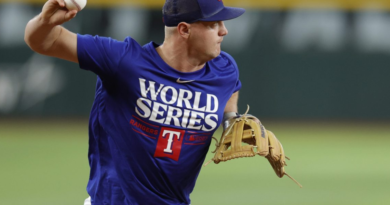The BBC faces a weekend with no soccer after Premier League presenters' wildcat strike in support of Gary Lineker
The BBC scrambled to stem an escalating crisis Saturday over its suspension of former soccer star and program host Gary Lineker for comments criticizing the British government’s new asylum policy.
As a growing number of Premier League players and presenters rallied to Lineker’s support, Britain’s national broadcaster was forced to rip up its radio and television sports schedule and face allegations of political bias and suppressing free speech, as well as praise from some Conservative politicians.
The broadcaster said it would air only “limited sport programming” over the weekend after hosts of many of its popular sports shows declined to appear, in solidarity with Lineker. He was suspended from “Match of the Day,” a popular highlights show, over a Twitter post that compared lawmakers’ language about migrants to that used in Nazi Germany.
Instead of blanket coverage on Saturday of the most popular league in the world, the BBC had no preview shows on radio or TV and would not be reporting on the final scores of Premier League games in the early evening. Lunchtime TV program “Football Focus” was replaced on Saturday with a rerun episode of antiques show “Bargain Hunt,” while early evening “Final Score” was swapped for “The Repair Shop.”
Soccer fans tuning for “Match of the Day” — the late-night soccer show that has been a British institution for 60 years — will likely get match coverage from the same feed used by broadcasters around the world instead of BBC’s own commentators and no studio punditry from some of the most high-profile stars in the British game.
There will not be any post-match player interviews, either. The Professional Footballers’ Association said some players wanted to boycott the show as a gesture of support, and as a result “players involved in today’s games will not be asked to participate in interviews with ‘Match of The Day.’”
The union said it was a “common sense solution” to avoid players facing sanctions for breaching their broadcast commitments.
The BBC said it was “sorry for these changes which we recognize will be disappointing for BBC sport fans. We are working hard to resolve the situation and hope to do so soon.”
Lineker, 62, was a household name in Britain even before he became chief “Match of the Day” presenter in 1999.
One of English soccer’s most lauded players, he was the leading scorer at the 1986 World Cup and finished his international career with 48 goals in 80 matches for England.
After retiring from a career that included stints with Barcelona, Tottenham, Everton and Leicester, Lineker has become one of the U.K.’s most influential media figures and the BBC’s best-paid star, earning 1.35 million pounds ($1.6 million) last year.
An enthusiastic social media user with 8.7 million Twitter followers, Lineker has long irked right-of-center politicians and activists with his liberal views, including criticism of Britain’s decision to leave the European Union.
The latest controversy began with a tweet on Tuesday from Lineker’s account describing the government’s plan to detain and deport migrants arriving by boat as “an immeasurably cruel policy directed at the most vulnerable people in language that is not dissimilar to that used by Germany in the 30s.”
The Conservative government called Lineker’s Nazi comparison offensive and unacceptable, and some lawmakers said he should be fired.
On Friday, the BBC said Lineker would “step back” from “Match of the Day” until “we’ve got an agreed and clear position on his use of social media.” Lineker has yet to comment publicly, and on Saturday went to his hometown of Leicester to watch Leicester City play Chelsea. He was greeted with cheers from bystanders as he arrived.
The 100-year-old BBC, which is funded by a license fee paid by all households with a television, has a duty to be impartial in its news coverage, and BBC news staff are barred from expressing political opinions.
Lineker, as a freelancer who doesn’t work in news or current affairs, isn’t bound by the same rules, and has sometimes pushed the boundaries of what the BBC considers acceptable. Last year, the BBC found Lineker had breached impartiality rules with a tweet about the Conservatives’ alleged Russian donations.
BBC neutrality has come under recent scrutiny over revelations that its chairman, Richard Sharp — a Conservative Party donor — helped arrange a loan for then Prime Minister Boris Johnson in 2021, weeks before Sharp was appointed to the BBC post on the government’s recommendation.
Former BBC Director General Greg Dyke said the network had “undermined its own credibility” by appearing to bow to government pressure.
“The perception out there is going to be that Gary Lineker, a much-loved television presenter, was taken off air after government pressure on a particular issue,” Dyke told BBC radio.
Keir Starmer, leader of the main opposition Labour Party, said the BBC was “caving in” to political pressure from Conservative lawmakers.
“They got this one badly wrong and now they’re very, very exposed,” he said.
___
AP Sports Writer Steve Douglas contributed to this story.
Fortune‘s CFO Daily newsletter is the must-read analysis every finance professional needs to get ahead. Sign up today.



